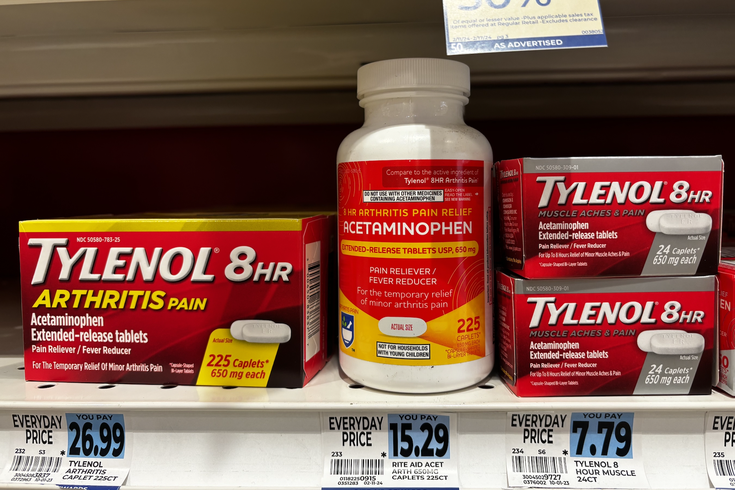
February 16, 2024
 Courtenay Harris Bond/PhillyVoice
Courtenay Harris Bond/PhillyVoice
Taking too much acetaminophen, packaged as Tylenol, can cause liver damage or overdose, the U.S. Food and Drug Administration warns.
During cold and flu season, be careful not to overuse acetaminophen, the U.S. Food and Drug Administration warned earlier this month.
People across the United States get 1 billion colds and the flu affects about 8% of people each year, according to the U.S. Centers for Disease Control. Reaching for acetaminophen, packaged as Tylenol – an analgesic that can be used to alleviate headaches, muscular aches, sore throats and other common ailments – is habitual this time of year for many people.
But too much acetaminophen can cause overdose and severe liver damage – sometimes requiring liver transplant. Acetaminophen overdose also can cause death, the FDA warns.
Symptoms may include nausea, vomiting, abdominal pain, confusion, rash and jaundice, among other complications. Sometimes overdose symptoms take several days to emerge or mimic those of a cold or flu.
That is why it is important to follow acetaminophen dosing instructions closely and to make sure not to take more than one product containing acetaminophen at a time.
More than 600 medications – prescription and non-prescription – contain acetaminophen. In addition to Tylenol, over-the-counter medication brands that contain acetaminophen include NyQuil and DayQuil, Excedrin, Mucinex and Alka-Seltzer Plus.
Acetaminophen also commonly is used in many frequently prescribed medications in combination with pain relievers such as codeine, oxycodone and hydrocodone.
The FDA recommends using the drug facts label on medications to see if they contain acetaminophen – which may appear as APAP, Acetaminoph, Acetem, Acetamin and Acetaminop – especially if taking two or more prescription or non-prescription drugs at the same time.
The current recommended maximum adult dose of acetaminophen is 4,000 milligrams total a day. For children, use the age and weight table listed on the drug facts label for dosing. When in doubt about dosing, ask a health care professional for help.
To avoid overdose, do not take more acetaminophen than prescribed or more frequently than prescribed – even if pain persists. Talk to a health care professional before taking any medications containing acetaminophen, especially if you have liver disease or drink three or more alcoholic drinks a day.
When prescribed a medication, ask your health care professional if it contains acetaminophen and tell them what other drugs you are taking. Anyone with questions can reach out to a pharmacist or contact the FDA by emailing druginfo@fda.hhs.gov or calling 1-855-543-3784.